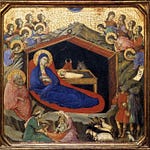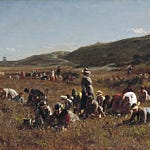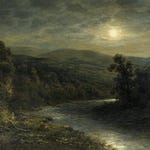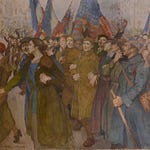“It hit me right out of the BLUE!” we exclaim, when something strikes us like a thunderbolt from above, or an inspiration from heaven, utterly unexpected. That’s because we don’t usually go around staring at the sky, since if we did that, we’d be likely to do what legend had it the philosopher Thales did. He was gazing up above, and he fell into a ditch. Thus did Thales become the emblem of intellectuals who don’t pay attention to things around them, because they always have their heads in the clouds. That wasn’t fair to Thales, a shrewd man who one year made a killing on the olive-oil market, but there you go.
BLUE, I am told, wasn’t always the color we associate with baby boys. These things do shift about quite a lot, as do words for colors themselves. But I have read that if you give baby boys and girls a choice between something BLUE-GRAY and something flesh colored, the girls will go for the color that resembles the human face, and the boys will go for the color of the sky and sea. I suppose that makes sense, just as it makes sense that the boys will like to stare at mobiles with many pieces moving simultaneously in different directions – like the parts of a machine, or the players on a football field, or men in war maneuvers – while the girls bond with other human beings. After all, if the boys didn’t do that and the girls didn’t do the other, we wouldn’t be around here to muse about it. Vive la difference!
Words for colors other than red tend to shift around a lot. In Purgatory, Dante describes the color of the cliff-face in the terrace of the envious as livido, and I’ll be damned – well, not damned, because we are talking about Purgatory – if I say I’m sure what that means. It’s the color of a bruise. What color is that? If you think about it, a bruise comes in several colors. There’s the inner part that’s a dark purple, and an outer part that’s yellowish, like bile, and the one part shades into the other. The inner part is why, in English, we say that if you got into a scrap with your friend, you’re BLACK AND BLUE, but the outer part seems to have been the color Dante had in mind, as associated with ENVY. In English, we say that someone is green with envy, but in Latin you’d be yellow with envy, and that sense has carried over into English through the French. If you look on someone with a jaundiced eye, it means that your eye is yellow, as if your liver was overacting, and made you livid, that is, full of anger that somebody else has some good thing that you don’t have.
The ancient Germanic word for BLUE is all over the descendant languages, though sometimes it produced a word that simply meant COLOR. The odd thing is that it is a cousin of Latin FLAVUS, meaning YELLOW, so that the common name FLAVIUS names a fellow that in English we’d nickname BLONDIE – just as the common name RUFUS names a fellow that in English we’d nickname RED, for his red hair. Meanwhile, if you look at the words for BLUE in our cousins outside of Germanic, you’ll find Welsh GLAS, which comes from an ancient root meaning to flourish, to shine, as something GREEN or YELLOW would do, or Russian SINIY, which comes from an ancient root meaning to SHIMMER or to be SHADY, like something GRAY. And in fact, in English we still use the word BLUE to describe something that is a lot closer to GRAY: the BLUE of a dog’s coat, for instance; or the BLUE VALLEY in Pennsylvania, where slate was quarried. Even BLUE EYES are often more gray than blue. But that association of BLUE with GRAY explains why, in English, we say that someone downcast is BLUE; we’re not thinking of the color of the sky, but perhaps of the color of a lake when the rain is coming, a kind of steely bluish gray. Hence we get THE BLUES, a phrase that entered the language about 150 years before anybody started to play THE BLUES. It’s said that all that glisters is not gold, but if you’ve got something BLUE, you can depend on it, for what it’s worth: TRUE BLUE.
Word & Song is an online magazine devoted to reclaiming the good, the beautiful, and the true. We publish six essays each week, on words, classic hymn, poems, films, and popular songs, as well a weekly podcast, alternately Poetry Aloud or Anthony Esolen Speaks. To support this project, please join us as a free or paid subscriber.












